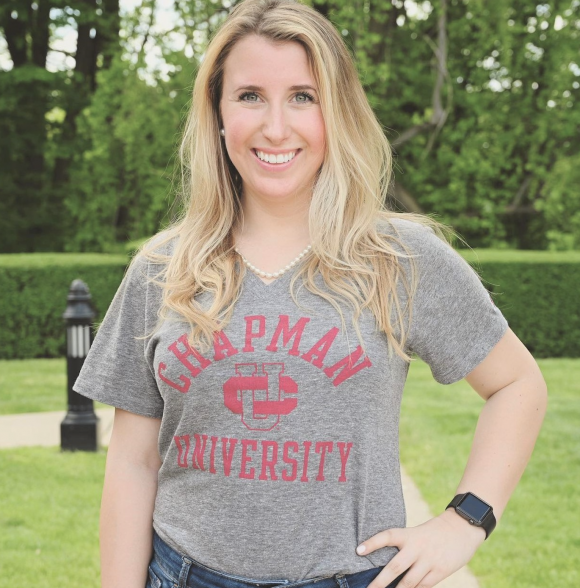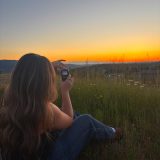Meet Erin Craw – PhD Candidate 2022 Read about Erin Craw's Experience in Chapmans PhD Program!
October 21, 2021

What year did you start at Chapman?
I started at Chapman University in fall of 2019
What made you choose the School of Communication at Chapman University?
I chose Chapman because of the faculty. I always knew what I was looking for and I was especially drawn to this program because of my desire to work with Drs. Miller-Day and Bevan. I wanted to work and learn from them and really admired their work. I am super fortunate to have also worked with several other faculty who have shaped me into the researcher and teacher that I am today.
What are you getting your PhD in?
Communication with an emphasis in health and interpersonal communication.
What do you plan on doing with your PhD?
My plan in very simple terms is to do work that helps others. I love working here and learning from professors here at Chapman. Teaching is a privilege and something that I am so grateful to have the opportunity to be a part of. I also have a love for research, specifically applied and translational research, which is exemplified in my work with first responders. The most important aspect of my research is how it will benefit or help others.
Please tell us a little bit about your dissertation.
For the past three years I have been doing formative research and conducting work on stress and coping. My dissertation takes a grounded theory approach to looking at preferences for mental health support and communication in law enforcement. The first phase involves conducting in-depth semi-structured interviews with retired and active police officers from all over the United States. . Based on findings in that first phase, I will then develop a one-time online survey to be distributed in the second phase. The survey will include various stressful scenarios and ask officers to answer questions about their preferences for support in those contexts.
How did you develop this proposal?
Basically, I have been building on this research my entire time at Chapman. Since day one, I have wanted to conduct research on mental health communication in first responder professions. During my time here, I was able to identify gaps and areas that need more focus. One of them is understanding police officers’ preferences for support in order to make sure they are getting the support they need.
How does this relate to your broader program of research?
Overall, my research is really at the intersection of health and interpersonal and so I am particularly interested in how stress, coping, and social support relate..
Do you foresee any hold-up in completing the Dissertation or do you (and your advisor) believe that you will be Dissertated by the beginning of Summer?
I’ve been really privileged that a lot of police officers have been willing to share their stories and experiences with me. It has taken about 3 years to build that rapport and to build my credibility working with such a unique population that is typically hard to access. I think that there aren’t going to be major roadblocks because of the work I have done prior to this point. If anything, the qualitative research takes time because I’m conducting in-depth semi structured interviews. That does take time including the actual interviews (typically about an hour), transcription, and the analysis. It just takes a lot of time but I’m confident that if I stick to it then it will be just fine! I also have an incredible committee who provides endless support and guidance, so I luck out there!
Tell us about comprehensive exams.
I took comprehensive exams in August and for me, I am a very applied researcher, so I took that approach when studying for my exams. I knew that if I could teach it and apply it to various contexts then I would know the theory or concept of whatever I was studying. Shout out to my fiancé, dogs, and mother who all sat and listened to me teach them about communication this summer to support my studying routine!
Any advice for future students preparing for comps?
I will actually steal a phrase from my former advisor at Fairfield University and that is to be confident in what you know. Keep practicing, take your time and stay focused! If I had to say what comprehensive exams meant in one word, I would say perseverance. You know more than you think you do, trust me.
Has your perspective on the process or point of comps changed now that you are on the other side?
Yes, I think it has. I was very intimidated at first to take these exams and I have test phobia like many people do. So that was pretty nerve wracking. But after taking them, you really start to see that it is to identify your level of expertise and also to be able to articulate what you have learned in the past two years.
Any advice for any students looking into the program?
The best piece of advice I would have is to follow your passion. Whatever your passion is in terms of research, find ways to get involved in projects. Also, to take advantage of any and all opportunities. Even if you’re tired or really busy, I encourage you to get out there and do as much as you can because three years goes by really fast. I have a note above my computer that says “if you cannot stop thinking about it, don’t stop working for it” – for me it is identifying ways to help people, especially first responders, cope with mental health-related problems through support seeking or other communicative behaviors. Find what it is for you and chase it.

